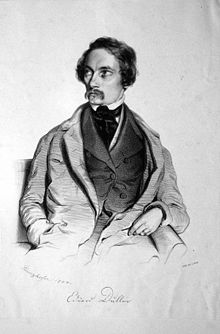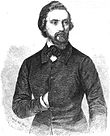Eduard Duller

Eduard Duller (born November 18, 1809 in Vienna , † July 24, 1853 in Wiesbaden ) was an Austro-German poet, historian and clergyman.
Life
Eduard Duller was born in 1809 as the son of a Viennese doctor. He studied philosophy and law in Vienna , but at the same time tried his hand at beautiful literature and performed the drama Meister Pilgram at the age of 17 .
Because of his progressive humanistic outlook, he was robbed of his working basis in Austria under the Metternich system ( demagogue persecution ). He left Austria in 1830 and first went to Munich, where he performed the play Die Wittelsbacher in 1831 . A year later he moved to Trier. There he made friends with Friedrich von Sallet . In Trier, however, he attracted the hatred of the clergy through his drama Franz von Sickingen . In 1832 he took part in the Hambach Festival .
In 1834 he went to Frankfurt am Main and from 1835 brought the phoenix there. Spring newspaper for Germany. out. The literary journal for this fiction magazine, which also took preprints from Georg Büchner , Christian Dietrich Grabbe and other representatives of the Vormärz , got Karl Gutzkow until the summer of 1835 . He was a member of the Frankfurt Freemason Lodge Socrates for steadfastness . In 1836 Duller moved to Darmstadt , where he stayed until 1849 and took an active part in the German-Catholic movement that sought to separate German Catholicism from the Roman Pope. In the pathetic style of the 19th century, he writes:
“Here I come back to the work of a free German Catholic Church. I can't help it; I would like to stand as a watchman in the control room and call it out to all German hearts every hour of the day and night - you Catholic priests and lay people in Germany, reach out your hand to the league, without fear of people; God stands by the brave for a just cause, and this Germany, this soil of freedom and fidelity, should no longer be desecrated by enslavement by Jesuits and Romans. ... You evangelical brothers, however, form the solid wall around this battlefield on which the German Catholics stand, the living wall that no Jesuit or Roman can break through in order to reach them .... So, when the German Catholics have become independent from Rome, the great day of peace will rise over a united Germany; even if it is after the hardest of efforts, a free existence, the honor and morality of a nation are worth such efforts. "
Finally he changed his place of residence one more time and went to Mainz . There he became a preacher for the German Catholic community in 1851. When Wilhelm Emmanuel von Ketteler became Bishop of Mainz in 1850, a heated argument broke out because Ketteler fought the German-Catholic movement with all his might. Since Duller was denied recognition as a preacher by the government of the Grand Duchy of Hesse-Darmstadt, he went to Wiesbaden . He died there in July 1853. His grave is in the main cemetery in Mainz .
Duller developed a lively activity not only as a poet and novelist, but later also as a historian. In modern thinking he is thus at the height of his time. From today's point of view, the popular presentation of the history of the Jesuit order, The Jesuits, as they were and as they are , occupies a prominent place in his work . In his opinion, he reveals the criminal activities of the order, which usually take place in secret, as well as its morally and socially damaging maxims. With many examples he shows the abuse of religion by the Catholic Church. In his book it says:
“Nonetheless, that Jesuit lie: 'As if only that prince, only that state, could be sure who surrendered completely to the guardianship of the Order and the Church in general', has been asserted for a long time, even to this day; The weak in spirit believe in it because with stupid eyes they can perceive the holy and exalted essence of religion, without which no family, and how much less a state can exist, only in the garment of the church, namely the Roman, and it to mix completely with the priesthood. "
Works
Novellistic and lyric works:
- The antichrist. Novella . (Part 1) , (Part 2) . (Leipzig 1833, 2 volumes). (Online at ALO ).
- Crowns and chains (Frankfurt 1835, 3 volumes).
- Loyola (Frankfurt 1836, 3 volumes).
- Kaiser and Pope (Leipzig 1838, 4 volumes) the most valuable.
- The Prince of Love (Leipzig 1842, 2nd edition 1854).
- Collected poems (Berlin 1845; new edition, Leipzig 1877).
Historiography:
- Vaterländische Geschichte (Frankfurt 1852–57, 5 volumes; microfiche edition ISBN 3-598-50604-X ), continued by Karl Hagen after Duller's death .
- History of the German People (Leipzig 1840, 3rd edition 1846; revised by William Pierson , Berlin 1861; 6th edition 1877).
- The Jesuits as they were and as they are (Leipzig 1845; 3rd edition, Brandenb.1861).
- a continuation of Schiller's story of the fall of the United Netherlands (Cologne 1841, 3 volumes).
- Maria Theresia (Wiesbaden 1844, 2 volumes).
- Archduke Carl of Austria (Vienna 1847, illustrations by Moritz von Schwind ).
- The men of the people represented by friends of the people (Frankfurt 1847-50, 8 volumes) a. a.
literature
- Constantin von Wurzbach : Duller, Eduard . In: Biographisches Lexikon des Kaiserthums Oesterreich . 3rd part. Typogr.-literar.-artist publishing house. Establishment (L. C. Zamarski, C. Dittmarsch & Comp.), Vienna 1858, pp. 390–393 ( digitized version ).
- Philipp Walther : Duller, Eduard . In: Allgemeine Deutsche Biographie (ADB). Volume 5, Duncker & Humblot, Leipzig 1877, p. 457 f.
- Duller, Eduard . In: Brockhaus Konversations-Lexikon 1894-1896, Volume 5, pp. 586-587.
- Duller Eduard. In: Austrian Biographical Lexicon 1815–1950 (ÖBL). Volume 1, Verlag der Österreichischen Akademie der Wissenschaften, Vienna 1957, p. 203.
- Paul Wentzcke: Duller, Eduard. In: New German Biography (NDB). Volume 4, Duncker & Humblot, Berlin 1959, ISBN 3-428-00185-0 , p. 185 ( digitized version ).
Web links
- Literature by and about Eduard Duller in the catalog of the German National Library
- Works by and about Eduard Duller in the German Digital Library
- Meyer 1888 http://www.retrobibliothek.de/retrobib/index.html
- Works by Eduard Duller in the Gutenberg-DE project
- Duller, Eduard. Hessian biography. (As of April 17, 2020). In: Landesgeschichtliches Informationssystem Hessen (LAGIS).
- Entry on Eduard Duller in the Rhineland-Palatinate personal database
Individual evidence
| personal data | |
|---|---|
| SURNAME | Duller, Eduard |
| BRIEF DESCRIPTION | German poet and historian |
| DATE OF BIRTH | November 18, 1809 |
| PLACE OF BIRTH | Vienna |
| DATE OF DEATH | July 24, 1853 |
| Place of death | Wiesbaden |
